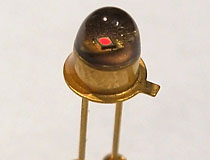
 |
| Monsanto MV1 LED | |
| Written by AnubisTTP on 2010-05-30 |
   |
| Description |
The Monsanto MV1, released in 1968, is considered by most LED collectors to be the world's first commercially produced visible light emitting diode. As can be expected, the MV1 bears only a loose resemblance to a modern epoxy-packaged LED. The semiconductor material is packaged in a gold plated metal can, similar to the TO-18 can packages used for many transistors. There is no reflector as seen in later LEDs. The diode die is mounted directly to a characteristic 'anvil head' contact surface in the bottom of the package, a technique that can be seen in many first generation LEDs. Under magnification, the GaAsP emitting sector can be seen as a circular void surrounded by an upper contact that covers all of the unused space on the top of the die. As expected, the MV1 is a very dim light source, and is barely visible under normal indoor lighting. It should be noted that until relatively recently, many collectors falsely identified this device as a Monsanto MV2. This is inaccurate: the MV2, though packaged similarly, is a green-emitting LED device.
| More |

Monsanto MV1 LED, normal operation. The MV1 is widely considered to be the worlds first commercially produced visible LED.
Monsanto MV1 LED at 30x magnification.
Early on, Monsanto MV1's were packaged in clamshell cases such as this.
A later version of Monsanto's LED packaging.
These rare samples from the Monsanto assembly line show various ways in which the MV1 manufacturing process could go awry. The rightmost example was actually dropped on the floor by a worker before the epoxy could finish curing...amazingly, the LED die still lights despite the mechanical trauma.
Unlit, the 'anvil head' contact is clearly visible.
Monsanto MV1 LED with power applied.
 Return to LEDs & Solid State Indicators
Return to LEDs & Solid State Indicators| ©2000-2025 Industrial Alchemy. All rights reserved. | Switch to mobile version | Contact | |  |